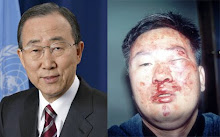http://schoolworkhelper.net/2011/02/park-chung-hee-former-dictator-of-south-korea/
Dominating from 1961 until his assassination in 1979, Park Chung Hee was a powerful anti-Communist dictator and the president of South Korea. He used the forces of torture and fatal violence to bring forth his authority for his country. Park served in the Japanese Imperial armed forces where he was inspired to rule and bring up Korea’s economy. In the early years of his dominance, Korea became the eleventh most successful economies in the world, but this boom eventually died leading Korea into a recession. Although Park industrialized and gained economic growth for Korea, he was seen as a manipulative and exploiting dictator because of his brutality towards some citizens.
When Park was in power, if a citizen was under even the littlest amount of suspicion of communism or again Park’s administration and laws, they were sentenced to torture and sometimes even death. The Korean war lead Korea into an anti-Communist country and a military coup. Park’s power caused widespread human rights abuses which caused great controversy for the country. Due to his goal of national economic growth, Park based his dictatorship on this. He did anything and everything he could to succeed, even if it meant violating human rights.
Given his dictatorial role, supporters of Park Chung Hee’s dictatorship see him as a man who did not cause controversy and was only trying to help South Korea’s economy. Citizens who do not support Park perceive him as a brutal dictator who only focused on the economy and not the labor. The citizens who spoke their mind and who were against Park were tortured in unspeakably ruthless ways. When he was in power, people who were against Park were arrested and imprisoned for multiple years being brutalized. Ordered by Park and known as one of the most brutal alleged abuse acts was the killing of Kim Dae-Jung. Kim has said that his abductors had nearly dumped him from a ship at sea a few days after the kidnapping, but stopped when a U.S. military helicopter made a low pass over the vessel. (Asia Pacific) Businesses were taken over by Park’s people as well as private land, which essentially resulted in a lack of freedom within the country. One of the first actions park took once he took power was to persecute the South Korean business leaders for gaining profit from the government. He imprisoned around twenty-four successful businessmen. (San Jose State University Department of Economics).
The Korean Central Intelligence Agency, also known as the KCIA, was to prevent any suspected communist activities, to arrest and torture them and to investigate power. Going against Park’s administration, Park was assassinated on October 26, 1979 by the director of the KCIA, Kim Jaegyu. “The assassination was apparently provoked by Park’s demand that protests and riots currently occurring be suppressed ‘even if it cost 30,000 lives.’” (San Jose State University Department of Economics) After his dominance, Park’s reputation has been the subject of further debate in South Korea as a list of names, in which he is included, of Koreans who worked with Japan. South Korea is still currently suffering due to human rights abuses, however not as horrible as it was with Park in power.
With the support and influence of the United States’ government, Park Chung Hee became a dictator for South Korea. His goal of bettering the economy of his country was established, causing great hardships for many citizens. Through torturing and imprisoning innocent people, he was successful with preventing the country from joining the rest of the ‘free world.’ Although he did move his country forward economically wise for a little while, it eventually collapsed and pulled South Korea back even further in a recession. He is responsible for Korea’s industrialization through economic growth but is also criticized for his dictatorial way of dominating Korea.
Works Cited
* (Author unknown) “The Park Chung Hee Regime in South Korea.” San Jose State University Department of Economics. N.p. N.d. Web. January 19, 2010.
* (Author unknown) “Park Chung Hee.” The Dictatorship.com. N.p. N.d. Web. January 19, 2010.
* “1973 kidnapping of Kim Dae Jung was approved by Korean president, panel fin.” Asian Pacific. October 24, 2007. Web. January 19, 2010.
Saturday, June 25, 2011
Subscribe to:
Comments (Atom)
